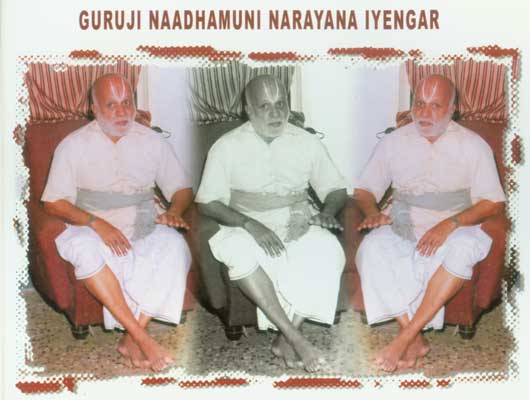|
GURUJI NAADHAMUNI NARAYANA IYENGAR
He was a Guruji who never claimed that he was one. He always said he was an ordinary human being. Yet, he was a Yogi, a Master, an ascetic, a sage, a seer, a saint, a mystic, and above all, a humanist to the core.
Guruji Naadhamuni Narayana Iyengar was an extraordinary boy in his youth. When his cousin Raghavan (who was to become Kaarai Siddhar later) learnt some magical feats from a musa in Thiruvananthapuram, the Musa offered to teach them to young Narayana Iyengar, who was not interested in it. Yes, even at that young formative age, he was aiming at something more lasting, more permanent. And, he got what he wanted. Yet, he exhibited several superhuman capacities later in his life. He saved an old Iyengar from the jaws of death when a gang of robbers near the Tirupathi hills waylaid the latter. This incident was reported in The Hindu. Guruji Naadhamuni Narayana Iyengar saved at least two middle aged persons from the verge of suicide. One was a Magistrate and the other, an employee of a Jewellery shop.
He was tall and handsome and had a natural gift for the fine arts, especially devotional music. He worked for the Railways and for the Immigration Department before he joined the Accountant General’s Office where he worked for several decades and retired.
|
 |
|
Guruji Naadhamuni Narayana Iyengar can be compared to his favourite monk, Sri Ramakrishna Paramahamsa. Though married, through the initiative of a Siddhar, he was not inclined towards married life. Like the Paramahamsa, he saw his own mother in his wife. Day by day, the intensity of his spiritual inclination increased. He lived a life of an ascetic in search of truth, as did Gautama Buddha. He would listen to monks with rapt attention. He taught ceaselessly to his disciples through parables, metaphors, songs and above all by his own life the basic truths of life.
He was interested in knowing more of the unseen that of the things seen. He found God in His creatures and in the action of His providence in the world. He knew that Love is the motive power of the soul. And therefore he rose above religion, caste or creed. He arranged the funeral of a Christian beggar in the true Christian way. He allowed a French lady to assist his mother in her household chores before he got married. One of the three Siddhars with whom he had links is a Muslim. He was an orthodox Brahmin. Yet, he was extremely progressive. And there was no contradiction in these two aspects of his life.
|